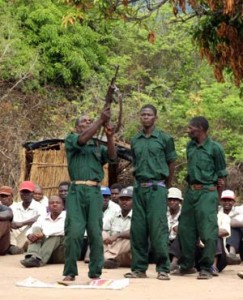 Earlier in the year, Renamo had presented a bill to set up “provincial municipalitiesâ€, which was openly intended to give Renamo control of six central and northern provinces (Sofala, Manica, Tete, Zambezia, Nampula and Niassa). The majority Frelimo Party defeated that bill, arguing that it was unconstitutional.
Earlier in the year, Renamo had presented a bill to set up “provincial municipalitiesâ€, which was openly intended to give Renamo control of six central and northern provinces (Sofala, Manica, Tete, Zambezia, Nampula and Niassa). The majority Frelimo Party defeated that bill, arguing that it was unconstitutional.
Renamo now tried to obtain the same result by proposing changes to the Constitution. The Renamo amendment sought to add “provincial municipalities†to the existing town and city municipalities. More importantly, it gave the elected provincial assemblies power to nominate the provincial governor, who would then be sworn into office by the head of state.
But that would only take effect after the 2019 general elections. In the interim, the governors would be appointed by whichever presidential candidate won most votes in the province in October 2014.
This would allow Dhlakama to appoint five governors – in Sofala, Manica, Tete, Zambezia and Nampula. Contrary to Renamo’s apparent belief, Dhlakama did not win in Niassa – there the Frelimo candidate, and now President of the Republic, Filipe Nyusi, won with 48.5 per cent of the vote to 44.4 per cent for Dhlakama.
Under the Renamo scheme, in the other five provinces (Cabo Delgado, Inhambane, Gaza, Maputo province and Maputo city) Nyusi would appoint the governor.
Moving the Renamo proposal, Jose Manteigas claimed that the people of the central and northern provinces “are demanding the restoration of the electoral truthâ€. Renamo maintains that the results of the 2014 elections – and of all previous elections – were fraudulent, and that Dhlakama was the real winner.
Frelimo deputy, and former Prime Minister, Alberto Vaquina retorted that the 2014 election were held under an election law proposed by Renamo, in which the political parties, including Renamo, were represented at all levels, from the polling station staff up to the National Electioins Commisison (CNE).
Vaquina recalled that on election day itself Dhlakama had publicly declared that these were the most transparent elections ever held in Mozambique. Only after he lost did he change his tune and call them fraudulent.
Vaquina accused Renamo of attempting “to govern without winning the elections. They want to make us accomplices in this plan to govern the provincesâ€.
For Renamo, Eduardo Namburete claimed that amending the Constitution “is a peaceful alternative for solving the crisis. We believe in a peaceful, negotiated solutionâ€. If the Assembly did not pass the Renamo amendment “it will be proving its incompetence before the people, and showing that the deputies are irrelevantâ€.
“The alternative to peace is conflictâ€, he threatened. “If we fail to reach consensus, then the judgment of future generations will be harshâ€.
Sergio Pantie, the deputy head of the Frelimo parliamentary group, pointed out that the 2014 elections were not about appointing provincial governors. At no point had it been said that presidential candidates would appoint governors, and the rules could not be changed after the game had been played and won.
He pointed out that, in the previous parliament, an ad-hoc commission had been set up to draft constitutional amendments, but Renamo refused to take up its seats on this commission and boycotted it from beginning to end.
A lengthy written opinion from the Assembly’s Constitutional and Legal Affairs Commission argued that, although Renamo only proposed changing a couple of articles, its amendment would radically alter the whole structure of political power as envisaged in the Constitution.
“The magnitude of the alterations proposed imply deep modifications in the organization and exercise of political power in the Mozambican stateâ€, the Commission said.
Neither the Commission nor the Frelimo group were opposed to changing the Constitution – but they believed that it was only through a general revision of the entire Constitution, involving a nationwide debate “that we can alter the political system, deepen decentralization, and undertake constitutional reforms that reflect the collective will, in a participatory, structured, coherent and harmonious mannerâ€.
The head of the Frelimo group, Margarida Talapa, announced that her party will bring a proposal to the first sitting of the Assembly in 2016 to set up yet another ad-hoc commission to rewrite the Constitution.
The third parliamentary party, the Mozambique Democratic Movement (MDM), suggested a compromise. Pending eventual direct election of the provincial governors, each provincial assembly, or each party with a majority of votes in the province, should submit three names to Nyusi, who would make the final decision.
Neither Frelimo nor Renamo took the MDM proposal seriously, and when the Renamo amendment was put to the vote the MDM voted in favour of it.
But Frelimo enjoys an absolute majority in the Assembly, and so the combined opposition forces went down to defeat by 135 votes to 86.
Giving the Renamo “declaration of voteâ€, the head of the Renamo parliamentary group, Ivone Soares, claimed that voting down the amendment “is part of a strategy to push Renamo into warâ€. She accused Frelimo “of continuing to rule without legitimacy, because they think they own Mozambiqueâ€.
Post published in: Africa News

